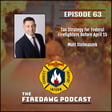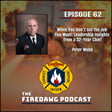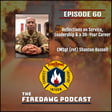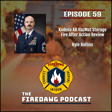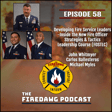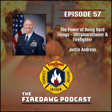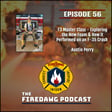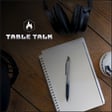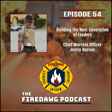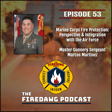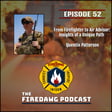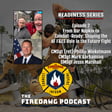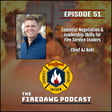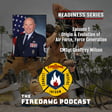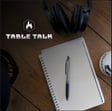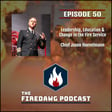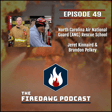Introduction to Episode 55
00:00:00
Speaker
Welcome, my name is Matt Wilson, and I'm joined with Chris Boikley. Thank you for joining us for episode 55 of the Fire Dog Podcast.
00:00:15
Speaker
welcome my name is matt wilson and i'm joined with chris boykeley thank you for joining us for episode fifty five of the firedar podcast In this episode, we have the privilege of speaking with two fire dog retirees turned entrepreneurs, Mark Abrahamson and Ashante Owens.
Entrepreneurial Ventures of Mark and Ashante
00:00:28
Speaker
Mark is the founder of Foxtrot Zulu, a company focused on filling the needs of the fire service industry and air force organizations, and also the co-founder of Proby Fire Training, specializing in providing training and certification for DOD and civilian fire departments.
00:00:42
Speaker
Ashante is the founder of Crimson Melt Restaurant in Oklahoma and the creator of Folds of Flame Foundation. a nonprofit dedicated to reducing suicide among first responders. It is my pleasure to welcome Mark Abrahamson and Ashante Owens.
00:00:57
Speaker
Well, Mark and Tay, good morning. Welcome to the Fire Dog Podcast. Thank you for joining
Military Background and Its Influence
00:01:01
Speaker
us. We're going to get into your entrepreneurial pursuits and your experience at the Fire Service, Air Force Fire Service, how that shaped these pursuits.
00:01:10
Speaker
We're just going to you know pick your brains and you know learn a little bit about what you guys have been through. Before we get into any of that, could you each of you introduce yourselves, highlight what you did in the Air Force, and whatever else you want to share.
00:01:24
Speaker
Mark, you can go first. All right. Well, Mark Abrahamson, um I enlisted in 1998. Shows you how old I am. um Did 26 years, had 12 PCSs. I think I filled every position in the fire department with the exception of assistant chief of health and safety. i think that became a thing when I was a deputy.
00:01:46
Speaker
I spent two years as an IG inspector at Space Command before it was a Space Force. And then my last two years I ah worked at IMSC, so I saw some some staff.
00:01:57
Speaker
um So the the nice thing about serving 26 years is, you know, I got to meet a lot of great people and work with a lot of great people. So um really developed lifelong friendships. and And so the Air Force really gave me something ah in that regard.
00:02:16
Speaker
Yeah. And, you know, for for me, Ashanti Owens, um you know, I did 20 years, two months, 10 days and like 13 hours. I mean, I'm not we we're not counting, but a little over 20 years.
00:02:32
Speaker
I enlisted in 2001 and retired in June of 2021. i retired and june of twenty twenty one um Been all over eight different bases and then six deployments.
00:02:46
Speaker
um And I ended my time at Joint Base Andrews. I filled every position, um rather temporarily or full time. um And i've I've seen a lot, of met a lot of folks and, you know, my story is is quite different than than others. I mean, I didn't come into the the fire service as ah like one of the kids like, I want to be a firefighter when I grow up. You know, mine was just like, hey, my wife is pregnant and they just needed something to help get the insurance because the baby was coming, you know. But then I, you know, I learned to to fall in love with this, with this craft.
00:03:14
Speaker
And we'll get into that later. But, you Yeah, I'm happy to be here and happy to kind of share how I'm pouring into others. One thing I'm realizing at the end of toward the end of my career is how much I took for granted the opportunities the Air Force provides. Yes. You mentioned, you know, you joined because you needed to support your family.
00:03:37
Speaker
That's not why I joined because I didn't have a family back then. But now having a family and experiencing that, I'm just so grateful you know When you interact with people that aren't in the military and you hear their experiences or what they go through or the medical bills that they have to pay, yeah you know i you know i kind of take a step back and like, wow, what an opportunity i have. or you know What an awesome opportunity.
00:04:02
Speaker
support network and I had an experience PCSing down from Alaska to Texas where I had an emergency and I had to go to the hospital and then I had to be medevaced out of Canada and that whole experience was paid for um you know thanks to the US government so just you know that going through that just grateful for so much that the military has offered yeah
00:04:31
Speaker
Well, look forward to, me personally, look forward to hearing how the Air Force did or didn't help in these business
Transition from Military to Business
00:04:40
Speaker
pursuits. what it you know Those things that you had to unlearn, Chris put together some questions.
00:04:46
Speaker
And one that he had was, what what did you have to unlearn from your military experience to help you outside of the military but you know in this entrepreneurial pursuit?
00:04:59
Speaker
But you'll we'll get to that a little bit later. We'll start with Mark, unless Chris, you have something that you want to ask before we get into it. No, let's get right into Mark. You're the you're the founder of Foxtrot Zulu and Probe Fire Training.
00:05:15
Speaker
Can you give us kind of a background on both of those businesses? Yeah, sure. So it's funny, if you would have told me that I was a business owner five years ago when I retired from the Air Force, I thought you were crazy.
00:05:27
Speaker
But here we are, right? um Never in my wildest dreams would I ever think I'd be a business owner. um I kind of got the ideas of of pursuing something a couple years back. And in fact, Matt, you you were present when we were at Creech Air Force Base doing part of the AF4Gen Working Group.
00:05:45
Speaker
And I had been talking to Jesse Marshall. We were talking about what were going to do you know when we get home. And he's like, well, I've got to work on my business. And I was like, business? Well, what are you talking about? And um so, you know, he was working a business and, you know, him doing it and saying it, he's a very confident, positive person. And he made it just sound so easy. and um And so now it kind of sparked my interest and and got me thinking, hey, maybe maybe running a business isn't so ah so difficult. but But at that point, you know i had no idea what it if I was going to do one, what it was that I would do.
00:06:20
Speaker
And um last year i was i was finishing up my master's degree and and during my thesis, my professor is like, hey, after retirement, you should do consulting. And I took it for a grain of salt and just said, okay, yeah, hey, great idea. You know, I'm probably gonna go back into the DOD civil service, but but hey, thanks for the idea.
00:06:42
Speaker
And then two months later, when I was at the senior fire officer summit, I was talking to the CEO of Ward Apparatus, who I had been communicating with for several years, being the lead advisor for trying to get an FZ, Fox Stratt Zulu, an FZ filled and the capability for for Air Force Fire Ace requirements.
00:07:08
Speaker
um So he's like, hey, what are you doing after retirement? And was like, yeah I'm not a hundred percent sure yet. And he's like, Hey, i'd love you to come help me build out this program more. And at the time I was like, well, I may not be looking for a full-time job right after, you know, i may want to take a break. Like everybody says, you know retire and then take a few months off before you get right back into it.
00:07:31
Speaker
And then, um, I was like, you know, I'm not leaving San Antonio. So he's like, think about it. I get back to me. And, uh, So later on, I was like, hey, you know what, maybe it won't be such a bad idea if I did it, you know, took the idea of consulting into it. So I put a proposal together of all kinds of projects that could be built around the program.
00:07:52
Speaker
Matt Bolian, And and and had a meeting with the CEO and he liked everything that I said so. Matt Bolian, Starting in March we just kind of started building it out right he'd give me his vision and i'd start doing projects for him really. Matt Bolian, And a part of fox rod zulu as consulting is commercial program development so.
00:08:12
Speaker
So if there's programs that are fire centric, you know, I can give that aspect of either being from the the firefighter perspective or for the the Air Force perspective. so So that was a key piece of it.
00:08:24
Speaker
um But it it kind of didn't it didn't stop there. For him, I was building manuals. So far I've built manuals, you know training courses, maintenance programs, long-term maintenance programs. It's something on the horizon that I'm building out for the program.
00:08:41
Speaker
So to try and make it fully scoped and have resources that's available for the customer. But then he's like, hey, what else are you doing? And i was like, well, you're it.
00:08:54
Speaker
And he's like, hey, you know, now's a good time to start thinking of other type of things that you can you can do with it. so So I started adventuring more out and finding what this consulting company paradigm would be with the business and and another part is like product sales and marketing support.
00:09:17
Speaker
um When I was active duty either as a fire chief or at IMSE, I saw the difficulties that fire chiefs were having with trying to get a a large purchase or procurement or trying to get a new fire trainer or all these kind of things. You know, the process kind of bogs down and you have a lot of roadblocks.
00:09:34
Speaker
And on the opposite side, from from the business standpoint, you have you know these companies that you know they're going out to these bases constantly giving quotes and they're like how do i help the fire chief get through this and so i thought right there is ah is in a is an um a chance for me to to kind of bridge that and kind of help both of them work through the process so um i had met with the uh the Fire Emergency Services Manager for Invisio, and I started helping them ah you know branch more into the fire world.
00:10:08
Speaker
It's something that they were looking for, and they didn't quite know how to approach it. So you know they were just contacting bases and and doing demos and all this kind of stuff. And I said, all right, well, let's come up with a strategy and and kind of work our way down. So you need a requirement and all these other things and and get in the process. So so helping industry in that regard, you know, kind of being the bridge between the fire fire chief and fire department and and industry selling products.
00:10:35
Speaker
um but then i kind of scoped it a bit more there's other things that uh that i can provide with it so if an agency is looking for accreditation and they don't really know how to to to put the the feet forward kind of do that risk-based predictive analysis so things that i was doing at imsc defining risk using money, manpower, ah other resources and stuff, trying to be able to develop that.
00:11:01
Speaker
The program process improvement, so you you you end up hiring a new health assistant chief of health and safety, you know, brand new, they don't know exactly what they're doing. It usually takes them a few years to to to get the training wheels off and get going. Well, I can jump in there for a week, sit down, kind of talk about how the programs work.
00:11:21
Speaker
the connections with the base agencies help them develop programs understand a little bit more and kind of bring down that learning curve um comprehensive project execution so i'm actually doing that with um with jbsa fire department right now they had uh they spent over the last several months working on um accreditation and and getting an ISO rating and really hampering up their their department management.
00:11:53
Speaker
And one thing that they want to do is they had all these SOGs FMPs from you know, being three separate bases, so they want to combine them. So I helped them bring that to the finish line. So we're we're in the process of of completing that now. so So those are the things that Foxtrot Zulu kind of developed and um and can provide.
00:12:13
Speaker
And then the other thing was training, coaching, and stuff. and And that's where I ended up teaming up with A.J. Keel, and he had the suggestion of – uh, HSO and ISO certs. There's, there's really no avenue for it.
00:12:29
Speaker
Uh, you have Alabama fire college, you have the CDC, but that's pretty much it. So how do, how do you get, how do you get a course overseas or some of these departments, um, that, that would really want to bring in a course. And if, if you had ever met Carl Beeman, um, he used to do it, uh, for several years, all kinds of safety, OSHA,
00:12:49
Speaker
and then the Pro Board HSOISO search. So um after he passed away, there was really nobody that was providing it. So AJ and I thought, hey, this now is a good opportunity to engage. So we reached out to the Fire Department Safety Officers Association said, hey, can we partner up with you? And and they love the idea, you know, of bring in bringing bringing more awareness and, ah you know, products to the DoD.
00:13:17
Speaker
so So that's what we're starting up right now, and and that's what we'll provide, and hopefully maybe more certifications in the future.
Challenges and Growth in Business
00:13:23
Speaker
you know So it sounds like so you started consulting with one company, and then kind of this element of almost building the plane as you fly it of like, Hey, I'm small business owner now. What other needs can I fill? Was that kind of how? Yeah, absolutely. absolutely So when it when it comes down to it, you know, we're providing solutions for problems and and fire chiefs have all kinds of problems and some of them that they don't even know about. And and I definitely saw that when I was an IG inspector, you know, and then being a fire chief itself. Right now there there's a hiring freeze and and and you have, you know,
00:14:00
Speaker
unfunded manpower. So how do you get the work done that you need done without having the resources available? So it's, it's you know, ah you can't hire a contractor to do firefighting operations, but you can hire one to to do program management and to help your processes and all kinds of stuff. So basically just providing solutions.
00:14:21
Speaker
And Carl Beeman is a brilliant mind. I had the privilege of, yes, sitting through some of his classes, and he was big in the the ensemble stuff, I remember. Yes, yes. and And that is one of the courses that we're bringing forward is the NFPA 1851 PPE Inspection and Maintenance.
00:14:38
Speaker
so So that's, yeah, ah the HSO, ISO, ProBoard, Cert. So there's that. But then that that PPE course, Infection Control, and then there's another one called Five Reads.
00:14:49
Speaker
so he He taught in OSHA courses as well, from what I understand. Yeah, yeah. and He's a guy that could make, I don't want to say make safety fun, but make safety interesting.
00:15:01
Speaker
Oh, absolutely. he was an incredible mind. Yeah, I sat through his HSO course, and and the way he presented it it, it made a lot of fun and and very interesting, and he'd have... you know, kind of remarks like, hey, in the 1950s, they used to do advertisements for asbestos, asbestos cigarettes and how safe it was. And and here we are now, like ah asbestos is is really bad for you. So, so yeah, he he he brought a lot of fun to a, you know, i don't want to say a boring topic, but it really doesn't spark interest when, when you're talking about firefighters and and wanting to do fun stuff. So. And his experience in Vegas with MGM, I think he was kind of the chief safety officer or something like that of MGM and the experiences that he shared of that, trying to dial in safety in a casino resort in Vegas.
00:15:51
Speaker
Those are some pretty cool stories and it's crazy some things that that people do out there, you know, and oh it really drives home the importance of a position like what he had, but great experience for him to draw on and teaching. Thank Yeah. So so we just want to you know carry what what he started and continuing it on and and being able to provide that for Air Force and and all DOD fire departments.
00:16:13
Speaker
It sounds like you're in a position now with Foxtrot Zulu, which by the way, um could have been Foxtrot Uniform. It could have. A story for another day. i know um It sounds like you're to the point where you you almost need to start bringing in more people. i'm not you know suggesting that you need to hire people, but you really, as your business expands, how are you able to handle everything on your own?
00:16:38
Speaker
Well, so so right now, you know, yes, i'm I'm building the airplane as I fly Foxtrot Zulu. So there there's a ah few ah few retirees that I know trusted, worked with. um So I lean on them. i Like I said, I was never an assistant chief of health and safety. So I don't have everything. Like I've got a good a good start from being a deputy and a fire chief. So I know how A lot of it's supposed to operate, but, uh, but I have a lot of reach back. So, and they have full-time jobs. So, you know, I'll, I'll, I'll reach out to them say, Hey, what advice can you give for this? Or if, if they have the free time and they want to take it, I'll pay for them to, to go somewhere and, and,
00:17:20
Speaker
and help a department or a company, you know, in any of the services. so So there's people I lean on. But I think as I continue to grow to get customers, clients, and and the thing builds, eventually I'm going to have to hire more people and and kind of bring this a little bit bigger than just my own personal business operating out of my home.
00:17:45
Speaker
I've always thought, obviously, we all have our own headaches dealing with ah government finance and you know we're dealing with the whole government shutdown right now in the new fiscal year.
00:17:57
Speaker
That's got to be ah a pretty major challenge as a ah contractor, anybody doing consulting within the DOD, just the whims of buckets of money, right? Yeah.
00:18:10
Speaker
and it It can be. um You know, if if your only customer base is is DOD, it can definitely have a huge impact on but But right now, ah with Foxtrot Zulu, DoD is part of of our customer base. In fact, the the recurring ones are mostly industry and that I've reached out to and and built relationships with and and started. And the ones that I have mentioned, I do keep client confidentiality, but they gave me the permission to talk about their their agencies. So, but... um
00:18:46
Speaker
But it can, especially when you're talking about doing training certifications. So with ah with not having a budget passed, you know, if if we have to go a long period of time without scheduling a course or doing something like that, it could have an impact. But, you know, you've got to plan that into your business and your business model and and come up with your SWOT analysis and what what are the weaknesses that you're going to run into or the threats that you're going to have. So it's all it's all part of business that I'm learning. Mm-hmm.
Ashante's Career Journey and Crimson Melt
00:19:17
Speaker
No, Ashante, totally different business model. Man, but yeah, way different.
00:19:24
Speaker
Some of the same some of the same um pinch points, though, um and some of the some of the you know the same deals that you know Chief has here. and it's um it's a love I say it's a love-hate thing because there's sometimes customers can get spicy. But um you know when I retired out of the Air Force,
00:19:46
Speaker
You know, I did Skill Bridge and when I was stationed in Altus in 20, at this time it was probably about 2015, I had got a, I had earned my second master's degree and in clinical counseling and I sat for the the NCE, the National Counselor Exam, which is it's like the bar, but for counselors.
00:20:08
Speaker
Um, and I passed. And so I was like, man, what do I want to do with this? Because Altus at the time had a very weird, um, schedule. It wasn't your traditional, like 48 on, 48 off or 48 72. It was very, very weird the way that they, um, that the AC at the time had done it.
00:20:24
Speaker
Um, but there was just a lot of that time where we had more 72 days off than, than not. And so, you know, twiddling thumbs on that, on that time, my wife's DOD, kind of talk about her in a minute, but, um, just at home, kids are in school. was like, I need something to do. So I sat for licensure, passed and started doing all of my clinical hours, got my 3000 hours, um, and became a state licensed therapist. too And then at that point in time, um,
00:20:52
Speaker
Red Rock, who I was employed with at the time, had up just magically opened a facility there at Altus. So I started, went into supervision and got all my hours and did all my stuff and started you know carrying a caseload there.
00:21:07
Speaker
And at one point, I think I had like 67 clients, um which was very difficult to maintain. mean, it was a very, very small satellite office. So um that was that, doing that, learning the ropes of, you know, being a therapist and whatnot. And then I got orders to Honduras to Sotocano.
00:21:23
Speaker
And so had to, you know, put that on pause and then, you know, did my year there. And then after that is when I got orders to Joint Base Andrews. So then, you know, did my time at at ah Andrews and then retired out of there.
00:21:36
Speaker
And so when Skill Bridge came along, um I just reached out to some of the contacts that I had there and they're like, oh you're coming back. And I was like, yeah, yeah. And it's I want to say it's weird that we ended up here in Oklahoma City, more specifically, more Oklahoma. But if you say more, nobody knows more. but people know Oklahoma City.
00:21:55
Speaker
um yeah When I was about a year out from pressing the button, I had to figure out, me and a wife were talking, like you know where are we going to lay roots at? like what Where are we going to live? What do we want to do? Because we've been so many places. We're from Nebraska.
00:22:07
Speaker
We are Cornhuskers through and through. um But we knew we didn't want to go back to Nebraska, right? So um it was a toss-up between San Antonio. um in Tampa. And then my family is from Tulsa.
00:22:19
Speaker
So we were like, oh, Tulsa's fine, right? But there's no base in Tulsa with the exception of the guard base. So we we we knew we wanted to be close to a base. So when we were stationed in Altus, we would have nowhere to really go or anything to do.
00:22:31
Speaker
And so we'd come up to more Oklahoma City and eat and do our go to the movies and do our stuff. So when you fast forward that, COVID happened, 2020, and right before that, um my wife at the time was, she was working at,
00:22:51
Speaker
Joint Base Andrews, and just got a random call from the 440S supply chain wing over here on Tinker and was just like, hey, we heard you're retiring. We have a position or you're you're moving. We have a position that might be open.
00:23:04
Speaker
would you Do you think you'd want to interview for it? And she was like, yeah. So she interviewed for the position and she got it. At that time, I was about um a year out. So we were like, screw it, I guess we're moving to Oklahoma City then.
00:23:15
Speaker
And so um COVID happened, that put a stop law or a stop movement on everything. um And then that May, June, they kind of looked at that. And then that's when she came on down here to the city. We built our home here.
00:23:29
Speaker
um And I stayed up in Andrew's doing my stuff, retired out, did my ceremony and stuff that November and then rolled out. So I started, you know, as the CQI director, the continuous quality improvement director, basically auditing all the therapists throughout the agency, all 756 therapists um and chart review and everything like that.
00:23:49
Speaker
um For me specifically, it really wasn't fulfilling um and and the pay definitely wasn't there. And so I started just kind of looking at some more things. And then I came across a a physical assets manager at the state of Oklahoma um for working directly for a tourism.
00:24:05
Speaker
And i was like, oh, state parks. Okay, that's different. And it was just asset management, inventory of all, you know, vehicles, you know, infrastructure, just everything.
00:24:17
Speaker
And so what folks don't know unless you live here is we have a barbecue restaurant here called Swadley's. It's it's the it's the Bill Miller's, if you're familiar with Texas or San Antonio of Oklahoma.
00:24:29
Speaker
Right. And so um they had the contract for the state parks that had the restaurants. where there was some some stuff going on, there was some um some number fudging and whatnot, and they got placed under investigation. Well, I'm the guy that found that $1.2 million dollars that they owed the state, and then that spiraled everything out of control.
00:24:49
Speaker
And next thing you know, the executive director got fired, the CFO got fired, they ended the contract with SWAT lease, and it it just really... um really blew up here. And so at that point they were like, hey, you're really good at what you do.
00:25:04
Speaker
And I was like, well, you know, only on Thursdays. um And so ah they were like, hey, would you like to be like a management specialist and start taking a look at our our our policies and and whatnot? I said, yeah, I love that.
00:25:16
Speaker
And so um started doing that, man. And I was in that role maybe maybe two months. And then next thing you know, I got made chief of compliance working directly for Governor Stitt.
00:25:27
Speaker
And at that point, then I was over um all 36 state parks, all policy, all guidance, all safety, all everything for the parks. And so um that role was fun. It was a good role. But I kind of felt like...
00:25:43
Speaker
I wasn't really being fulfilled in that role because all I would do is just travel to the state parks, look at their programs, talk to the park managers, the rangers, um and just just kind of just middle out. It was cool. You stay the night for free in the lodge or you know cabin or whatever. It was cool, but it really wasn't I couldn't see myself doing that for 20 years.
00:26:00
Speaker
And so um started thinking to myself, like, I'm really tired of like working for other people and what what can I do? So that's where Crimson Melt was born. I remember OU game was on on a Saturday.
00:26:11
Speaker
um it was like 2 p.m. The wife was like, I'm gonna go take a nap. Man, she took like a two hour nap. And by that in that two hours, I had come up with a design concept, a logo, like concept, like everything of what I want to do.
00:26:24
Speaker
And it came with gourmet grilled cheese sandwiches. And the whole gourmet grilled cheese sandwich idea basically stemmed from just something I did in my house and then also for for my firefighters you know throughout the department.
00:26:37
Speaker
And what it was is, you know, people knows, well, at least where're out where I was at, people knows when Chief stays at night, Chief cooks or Chief buys dinner, right? that's That's the experience that I had.
00:26:48
Speaker
And so people were like, hey, you're your stay at night. What are you going to cook? And I'm like, I'm making this grilled cheese sandwiches. and they're like, Okay, and I'm like, trust me guys, this isn't this isn't normal. And I would find all sorts of stuff, and we put all sorts of stuff on this grilled cheese, and it was like a foodie style sandwich.
00:27:05
Speaker
And so that's where the Crimson Melt idea really came from. You know, we'd go on a call, we'd on an in-flight ground emergency or something, it's two in the morning, you're not going back to sleep.
00:27:16
Speaker
So I said, what are you going to You know, firefighters, you know, we always got bread and butter and cheese and in in the fridge, in the shift fridge. You know we do. So I'm like, we'll make a grilled cheese sandwich. So that's kind of like where it was, where it was born.
00:27:27
Speaker
And of course, you know, B-Shift is like, well, what do they eat? You know, the day before, you know, they probably had a barbecue something, you know, you steal their food. So we throw some of their stuff on the on there. And so that's where the idea for the grilled cheese was born.
00:27:41
Speaker
And so Oklahoma, looking at all the comps and everything around here, we didn't have anything like that. We had Tom and Chi, but Tom and Chi was a little bit different. If you don't know them, they're from Shark Tank. um I went there, they're really underwhelmed, under impressed.
00:27:54
Speaker
And I was like, man, we could do better. So so um that's where that was born. So then we have the, what we call fully engulfed milkshakes, huge milkshakes with like whole piece of cake on top, whole piece of cheesecake on top, just all sorts of goodies. And like, it's, if you know, Black Tap or the Yard milkshake bar or Crazy Mason, we are just like that, just on the fire side. So when you walk into the Crimson Mount, it looks like an old vintage Air Force firefighter from station.
00:28:26
Speaker
We got a lot of vintage equipment in there um and and stuff like that. i wanted I wanted to tell the story, the DOD firefighting story, um and and in and specifically the Air Force firefighting story, because a lot of people don't think about it like, oh, I guess the DOD does have firefighters. They were kind of like a forgot about ah deal, um especially to the public out here.
00:28:44
Speaker
And so the milkshakes was born kind of in a different light, way different way. I had the initial idea and the concept of the restaurant was going to be cheesecake because I'm a master cheesecake maker.
00:28:55
Speaker
I've been doing it for 25 years, but I knew that that wouldn't yield me a um a really good effective ROI or return on investment. And so I was like, what can I do to, you know, couple something with the sandwiches? and And Oklahoma has a ah dessert market,
00:29:11
Speaker
but it's it's very basic. you know it's It's your Baskin Robbins. You might have a place that's localized that sells something that's a little bit more bougie, but not really to the level that I was thinking. And so um so I work for the w WWE and I've worked for the WWE w now for about nine years.
00:29:28
Speaker
And so we raise my organization, which I'll talk about in a minute. We raise money for pediatric cancer and um autism and a whole bunch of other things. And so it's called Mania Club and more specifically the Mania Club Champions of Hope.
00:29:41
Speaker
And in that time, we've raised about $300,000 for um the V Foundation and the WWE and the Connors Cure. And so when we went to SummerSlam in Nashville about um um three, four years ago, we are came across a place called Legendary Milkshake.
00:29:58
Speaker
And i was like, man, this is amazing. You know, so i was like, that's it. I have a good idea, but I could take it to a next level. And so um I coupled those milkshakes with the grilled cheese and made up a restaurant. Got my funding down, got got everything completed with it.
00:30:17
Speaker
And um went to Starbucks one day, picking up me and the wife something. And in the drive-thru this bougie girl, like bru you know, anime type, happy, bouncy.
00:30:31
Speaker
And I was like, I need you to be my GM. her Her name is Susie. um She was amazing. she She's amazing. So um she worked for Starbucks for 10 years. And so I poached her.
00:30:42
Speaker
uh from there she brought all that starbucks uh customer service all that training we used the same machines we used the same pos uh the point of sale system um and all that so so she brought all that experience she made training plans for me for the employees and everything so um i was blessed and lucky to to really find her um as the crimson melt has been ashante can i interrupt you real quick i'm looking at this uh crimson melt menu oh my gosh
00:31:11
Speaker
No, this one's called the shift fridge. If it's in there, we're eating it. Grilled breaded chicken, bacon, mac and cheese, cheddar, mozzarella, fries, cheese curds, drizzled with bacon aioli.
00:31:26
Speaker
It's good too. It's good too. Well, you're not going to say it's bad, right? No, no, definitely not. It sounds good. I'll step on I'll step behind it. Man, I feel like this is such a valuable like peek behind the retirement curtain.
Supporting First Responders through Business
00:31:42
Speaker
Right, where Ashanti, you went from, and know, a couple years therapy to state parks to owning your own restaurant. yeah I feel like so many of us think when we're young, you know, it's like maybe you're a couple years in and you're planning on staying in the military, that you're going to retire.
00:31:59
Speaker
You're going to be 40-something and that you're going to be, you know, 10 toes up in the sand drinking margaritas or whatever. And it's probably not reality, right? A pension at that age is nice, but it's still a very few income. You're still very young with a lot. You need a sense of purpose, too.
00:32:17
Speaker
Yeah. And that's and that's so so that's kind of the other part of this is I have a fervent belief that God wants me to pour into others, right? and And he wants me to take care of people, especially are my first responders. And so um that's where the Folds of the Flame was born.
00:32:34
Speaker
And the Folds of the Flame is ah is ah as a dual initiative that um takes care of first responders um with suicide prevention, awareness, and postvention. And so the Crimson Melt, where that comes in into play with this is that the Crimson Melt feeds the Folds of the Flame um And vice versa. Right. And so what we do is basically catch and release. We connect folks to resources that have any type of suicidal ideation um or suicidality um history in their life.
00:33:04
Speaker
So I was trying to figure out, OK, I don really don't want to lose this license. I really don't want to. I worked really hard to to to become credentialed and whatnot and how and become a licensed therapist. And so.
00:33:15
Speaker
I started my 501c3 based on that. And so portions of every single sale go towards that. And, you know, we have a ah website, foldsoftheflame.org. And if you go on there and you're just like, hey, I'm having um an issue with something, because, you know, when when somebody dies by suicide, nine times out of 10, that insurance is not going to pay out.
00:33:36
Speaker
um unless they have a clause in there. And so providing for the immediacy of services for for folks is is is important, right? Because somebody may have died, but you still got to keep the lights on. You still got to have food on your table. You still got to, life still has to happen until you deal with your affairs.
00:33:52
Speaker
And so our... organization helps people in that immediate time. Maybe we we do a grant or we do ah a stipend for for folks to help pay some bills. and But further than that, we help connect them to resources um for the longevity of them as they as they start the transition um of their of of what is going to be a new life for them.
00:34:12
Speaker
So we partnered with the Oklahoma State Firefighters Association with that initiative um and all of our local departments. And folks know, um because I'm trained in in Safe Talk and Mental Health First Aid, CAMHS, which is like the Collaborative Assessment of Multiple multiple Suicidality, um in teaching departments and first responders the what we call invitations, but the signs of what suicide looks like before it actually happens.
00:34:37
Speaker
And so um I run this restaurant. It's like like, you know, Cape Crusader. I run this restaurant in the day and the nighttime. i do I do this. But at that point, like, that we were that Crimson's been going or whatnot, I, you know, at my GM runs a restaurant. at My ASM, my assistant store manager manager, they run a restaurant. So, like, they don't really need me there. I don't pay myself a salary out of there. i mean, if I need money, I just take a bank draw.
00:35:00
Speaker
um So it's like i now here I am again with with with free time. And so... um At that point, I had to figure out something else to do so that So now I work on Tinker Air Force Base, and I'm a community resilience coordinator.
00:35:15
Speaker
And what I do is um help for folks over here with resource and referral, provide therapeutic intervention um to all of the employees here within the Oklahoma City Air Logistics Complex.
00:35:26
Speaker
So we have 10,000 civilian employees. We have 85 military. um And we are basically here for them. We have the largest group in the Air Force here, AMXG, with 4,500 people. um And we are just busy. I mean, if you've never seen a ah plane built from the ground up,
00:35:42
Speaker
this is this is This is where the rubber meets the road right here. I mean, this this base, it's headquarters, Air Force Sustainment Center. I've never worked in a depot. I've never even seen really any of this stuff. But now being here for a couple of years in this position, it is is crazy to understand the whole beginnings before it even reaches the warfighter downrange.
00:36:01
Speaker
um And so it's it's I'm humbled to be in this position. My time is short, though, because I'm getting ready to I took a deputy position at the guard base over here. So my time, ah they pulled me back in.
00:36:13
Speaker
um So i'm I'm just happy with with where I am in life, man, and and what I'm doing to help others. Well, Tay, you know, it sounds like you you like a challenge. And I think that's the the thing that that I really enjoy is doing something new and challenging myself to to do a different ah different thing and go on to a different level. And it definitely sounds like ah you're you're doing that. I mean, you're all over the board, so it's good. man Yeah, yeah, man. i Sometimes I don't even know what day it is, man, because I'm getting pushed and pulled. I got a call over here from from, you know, the GM, hey, blah, blah, blah is wrong, or the the front door won't open as of yesterday.
00:36:48
Speaker
you know, I got a call over here, hey, I have an employee that you need to talk to. I got a call over here, hey, so-and-so so committed suicide or died by suicide. We need help. You know, so, like, it's, every day is different, for sure. Right. For sure.
00:37:00
Speaker
Yeah, both of your stories or both of your experiences are inspirational. It really, it makes me be introspective and... you know, thinking about my limitations, you know, what you two have done just in a really relatively short period of time and, you know, a handful of years in some cases and running multiple things at once.
00:37:19
Speaker
It's like we're so we're capable of so much. It really just comes down to the will to do it. And of course, chasing a purpose, finding what that purpose is and and making sure that that's connected to what you're doing too.
00:37:30
Speaker
um But it's, yeah, it's inspirational to hear how much involvement um each of you have We're just over here trying to be like you. No, I'm trying to be like you.
00:37:42
Speaker
I'm right behind you. I don't know about the entrepreneurial ah sense. I'm not sure that I have that. but But I think you, too, provide a great example of, you know, we sometimes place limitations on ourselves. Like, oh, that's that's too far out. That's unrealistic to try to go after.
00:38:01
Speaker
But i mean, look at you doing, you know, three, four things at once. um And then finding good subordinate leaders, of finding people to bring into your team to be able to handle business. You know, it sounds like Crimson Melt is pretty much humming. You know, it's a well, well-oiled machine that you just go and say, hey, what do you guys need?
00:38:22
Speaker
yeah What kind of things do you need from me? So you got good people working for you. I'm curious where the name, you may have mentioned it and I missed it, the name Crimson Melt. Yeah. so So, even though I can't stand OU, crimson is their color.
00:38:38
Speaker
So, crimson, and then, of course, ice cream melts and cheese melts. So, crimson melt. That's where it came from. Okay, so connecting the community a little bit. Exactly, exactly. i thought about I thought maybe crimson, fire, I didn't know if that...
00:38:53
Speaker
Hey, appealing to the market right there. Yeah, yeah absolutely. And they love it. They love it, man. so yeah I mean, those are some of the things that you you learn that you you don't when you're and your active duty Air Force is is the things with businesses, like appealing to your market and finding you know how well your business is going to do based on your market and what the gaps are and and and how valuable are certain things that you did you took for granted and when you're active duty, like time.
00:39:21
Speaker
Right. Your time and skill are are so valuable now. But but when you were active, it it it it didn't really mean that much. You know, you had a ceiling and it it took you however long to do however long. But now, you know, even if you do something in a short period of time, that value is is still worth the the skill and experience that you bring to it.
00:39:44
Speaker
Yeah, for sure. Yeah. but What are some examples of that in your business where you you've felt yourself you know make that shift mentally when it comes to leveraging your time or skills?
Military Skills Applied to Business Success
00:39:57
Speaker
Well, I'll tell you this. Some of the things that I would do when I was active, like in charge of a program, doing program building a program, right?
00:40:08
Speaker
You spend hours, hours, hours. you're You're punching away at building plans and and doing this and that. and And now um all that experience, now it's funny, you look at the way a fire department is organized and operates, and you can take that same structure and carry it over to the business side, right? Because it's all the same, you're managing an operation and you can piece everything together, you just put different terms on it. And if you wanna go back, all right, this person would be my deputy, right? And they'd accomplish all this type of stuff.
00:40:43
Speaker
and and you can build it out. So so you have that. But where where the time is, is like if something took me a whole day to do when I was active and and now I'm like, all right, well, I can punch that out in one hour.
00:40:56
Speaker
it You know, for a customer, and do i do i just charge them the hourly rate and and you know you got you got a day's worth of work in one hour or do i give them hey my skills and experience that went into this it took me an hour because i used ai and and then was able to edit and know what i'm doing and how to get to the answer a lot quicker so does that time and value uh you know is that is that mine to to charge uh for so so that's something that you got to take into consideration especially when you're talking about consulting like how
00:41:27
Speaker
how do you charge and and and how is an operation go where where you're billing and and doing invoicing and stuff like that so you know you don't want to sell yourself short and you don't want to spend hours upon hours working for pennies um so you just got to find find it out and and then you realize that hey your your time and skill and experience has value yeah You talked a little bit about how the hierarchical sorry, tade did you have some? No, no, you're good. You're good. Okay. ah You talked about how the hierarchical structure of a fire department, yeah it's it's transferable to to the business too.
00:42:03
Speaker
um What other elements of the fire service you think have shaped, I mean, obviously, Mark, you're in the business of fire service and helping fire departments. But I guess from a business perspective, what other elements of the fire service helped shape the approach to the business?
00:42:16
Speaker
so So one thing I did a lot of when I was a fire chief was strategic planning, right? Like thinking three years out, five years out, budgeting, yeah finding out, um you know, what what are where is the base going? Is it going to require, is the new mission going to require more people, more training, all this different type of stuff?
00:42:38
Speaker
Well, it's the same stuff that I'm going through now. Like, okay, I got to build this. How was the process that, that, are like proby fire training is is really where i'm putting a lot of my energy right now and so how does that process work and it was easy for me to map it out and plan it just like i did a fire department going all the way from you know the time a customer has an inquiry about uh a course all the way to all right they got their certifications and now we're doing a ah course review through quality control so so all those processes kind of lay on and it's just it's strategic planning and it just goes right in and and to something that uh tay had mentioned you know uh recruiting people that are skilled in certain areas well you know i was never at the schoolhouse i never i was never a lead instructor i did adjunct instructing at affit and so on
00:43:31
Speaker
But, but that was never my forte and, um and nor about trying to do, you know, training curriculum and all this other stuff. So, so AJ and I, we, I don't know if you guys heard about him, but his name is Robert Lanning. He just retired.
00:43:45
Speaker
Chief Lanning. Hi, dude. we we We hired him, and now he's our training director, and and he kind of leads all all that type of stuff. So bringing in talent. Man, he retired like three days ago. you got Yeah, we're quick. We're quick. We need to be fast. work yeah He was my first supervisor, man. I've known him for 25 man.
00:44:05
Speaker
Yeah. So, so he's, yeah, you bring, you bring in talent. He knows how all that works and it helps us, you know, we, we need to learn more. So we're learning from him and yeah, so it's going to be good. Well, the, the model is there, uh, to, to, to really get after.
00:44:22
Speaker
Yeah, that you bring up great points. Strategic planning, risk assessment, critical community risk assessment, standard to cover, just like those foundational things in the fire service are transferable to anything.
00:44:36
Speaker
I think the fire service does a really good job with that. And we do a good job with that an Air Force fire service. Yeah, absolutely. You mentioned community risk assessment. I mean, you're doing the same thing on the business side. You're looking at your community and finding how yeah how is my product selling in the market and know how available is it going to be? And, you know, are are my customers only meeting, you know, the the kid age or or is it the, you know, the four year old all the way to 90 year old type and and so on. So. So, yeah, there's a lot of.
00:45:06
Speaker
transferable skills that you learn active duty side and the fire service that that relate over to to the business side. Yeah, what about the leadership?
00:45:16
Speaker
It feels to me that the Air Force does a great job in teaching, you know, foundational leadership principles. Of course, leadership, like anything else, is learned through experience. You have to do it to get good at it and to to dial in some of those theories How do you think that has helped in business?
00:45:36
Speaker
Well, I would say, for me specifically, yeah, for me specifically,
00:45:44
Speaker
leadership directly impacts customer um satisfaction in my in my line of work, right? And so it's...
00:45:55
Speaker
um it's it starts from the time that they park, you know, we we we call it what, you know, scene size up, right? From the time that they park to the time that they they pull away. you know What does that entire experience look like, right? And so for me,
00:46:11
Speaker
I'm very big into SEO, search engine optimization, and you know because I want customers to come back. right I'm not really worried about the first month or the three months or so. I'm worried about the next three or three to five years. I have a three to five year plan even in that. And that comes from, you know Mark hit it right on the head with you know strategic planning and what does it look like going forward? you know How are you going to grow your model? How are you going to do your things?
00:46:33
Speaker
and so The leadership for me, i've you know we we all go through different forms of leadership. We all experience good and bad leaders, right? And for me, I've learned more from bad leaders than I have good leaders, right?
00:46:45
Speaker
And so it's translated ah very well because hell, even my... ah my my managers, they all get Kelly days, right? And, you know, their Kelly day, they get a day off, you know, because, you know, those nights and those weekends are long and they're hard.
00:46:59
Speaker
And, when you know, when you're making, you know, 2,000, you know, 3,000 sandwiches a week and you just go, go, go, it's tiring. it's It's not hard, but it's just tiring. And so, you know, I give them a Kelly day and I brought them fully into the the fire world of what we do.
00:47:20
Speaker
We also have a monthly staff meeting and we have a bi-weekly staff meeting with, with this staff. So the monthly staff meeting is just with, with management and then bi-weekly is with the staff.
00:47:32
Speaker
And so, um, that's where for us, we go over those Google reviews. We go over training, we go over, um, cleanliness and, you know, health department stuff. And, uh, we let folks know what's, what's going on, what's happening, what's upcoming, what, you know, new sandwiches, all the things, right? So the leadership of that and being at the helm of that ship, um,
00:47:52
Speaker
I can't you know stress enough that it it matters because me, I don't work at the restaurant here. you know If they ever see me working at the restaurant, it's because one of my managers needed um some time off for something. Like, I'll be working Saturday because it's it's Brittany's birthday.
00:48:08
Speaker
So other than that, I'm not there, right? But it's important for me to show a presence. you know I go often. um And I like to mess with them and and and challenge them. I bet you I can make this shake faster than you. and And they just love it. Right. But they want to see the presence. They like the structure.
00:48:23
Speaker
um And it's ah it's important that, you know, you lead from the from the front with them. Right. So, um yeah, that's good. And when we talk a lot in the military about empowerment, delegation, and Dante, I'm struck by, you know, your vastly different lines of effort in your life from the nonprofit to a restaurant to still working full time on base. You're ready to pivot to the the deputy position you mentioned.
00:48:52
Speaker
Are there specific systems or processes that you've pulled from your time in the military that enable you to, you know, delegate to that level.
00:49:04
Speaker
Sure. Yeah. Yeah.
Effective Management Strategies
00:49:06
Speaker
You know, being an MTI, um, you learn how to time management real quick, you know, and then going through just, you know, my, my time in a service in general, um, you learn how to time management, um,
00:49:21
Speaker
um and delegate together, you know, I'm an expert at it. And I've learned how to really leverage people's strengths and also even more so leverage their weaknesses, right? Like I love a strength, don't get me wrong, but I love a weakness more, right? Because I just, that means that there's something there that I can develop.
00:49:37
Speaker
Not that I can't develop a strength, but developing a weakness is is better, right? I like to turn that into a strength, right? So when you said earlier, you know, ah a well-oiled machine, that's what we are. And it didn't start out like that. ah Man, if y'all could see grand opening at me had three and a half hour wait times. I mean, it was we just didn't know what we were doing, man. It was off the chain. But um you fast forward to, you know, as being open, you know, working on year three here.
00:50:04
Speaker
um We've got it down pat. And. um You know, it's the my past and everything being able to juggle one thing. i mean, I can walk and chew bubblegum, right?
00:50:16
Speaker
It's about putting people in the right places in the right positions. I mean, I'm in the middle of opening another restaurant right now, and it's a completely new concept called the Oklahoma Milkshake Factory. And so that I'm attacking not knowing what I know now.
00:50:30
Speaker
I wish I would have knew a couple years later, I'm attacking it from a very high level to the point where the governor is involved, the mayor of Oklahoma City is involved, the Oklahoma City Thunderer are involved, um because it's going to be a destination spot. so i As Mark said, you kind of grow every day. You kind of learn every day what what's needed and what's not. And so, you know, people are like, man, when do you sleep? I'm like, I get plenty of sleep.
00:50:55
Speaker
You know, I just played Assassin's Creed just a few hours ago before I went to sleep. I'm, you know, I'm good, you know, slicing and dicing. I was in the city. Spider-Man needed me. So, like, you know, it's it's all about being comfortable with with the people that you put in your positions.
00:51:08
Speaker
So... You bring up a good point about facing challenges. You know, we talk about all the great, but I'm sure that you've both encountered a whole lot of challenges, especially in the initial stages of creating these. i I think it's probably important, you know, I'm just, I'm assuming here, of course, but I think that's just a good, a good lesson to convey to people who aspire to do the same things as you is, yeah, you're going to encounter challenges.
00:51:34
Speaker
ah It's important to it. to, I guess, see the light at the end of the tunnel and to endure through those challenges and to stay positive through the experience, right? Yeah, I would say it's ah it can be a bit intimidating. And and I think anybody that's starting out, you've got a good idea. you know if if if you're not sure of what you can do with it, you know you may never take that second step. And and you know that's probably what a lot of people go through, especially you know during the military. You have to willing to fail, right? You have to be willing to fall and fail and get up and try again.
00:52:09
Speaker
But but it's it's kind of leaning on resources just like they teach you in in the Air Force. So one thing that I did before I retired is i I did the Boots to Business ah course, right?
00:52:23
Speaker
and And that was pretty good. It teaches you some basic stuff. the the legal, the accounting, all that type of stuff, right? Banking. um And the Small Business Administration has a bunch of courses online that you can get through. So if you as an individual want to get started, you know, it's it's ah it's a way to take that second step. but I found what I found for me is having a business mentor, somebody that I kind of trusted that has a lot of credibility on the business side, kind of give me advice like, hey, what should I be looking for? Like, am I going about it the right way? Like, am I doing too much, too little? Like, where where is the sweet spot here?
00:53:02
Speaker
and And then just getting that support. And then. I think going into Pro B Fire Training with AJ Keel, both of us kind of venturing into that together and kind of picking each off each other's brain has really helped that kind of develop a lot faster than than I anticipated. so So it's moving good. but But yes, taking on a business can be very intimidating for for somebody that that's interested to do it. So having that help definitely helps.
00:53:30
Speaker
Yeah, you know, and kind of just to kind of double click on that. I mean, like for me, like it, it was a scary thing, right? Because it's, you know, I know nothing of running a business, let alone being a restaurateur and understanding what health code really means. And because you're going to inspected, you're going to get audited. Right. And we get we get it often. Right. And um especially from the ABLE Commission, which is our alcohol commission, there's there's so many legalities and stuff. And so A business owner, I felt was like, that was the easy part. The health the health stuff, you know, making sure things are at temp, and making sure um things are fresh, your hot holder items are good. Like that in the beginning was very, very stressful because I didn't know.
00:54:12
Speaker
And I fight fires, man. i don't I don't know about that stuff. And so luckily I had Susie there to teach me, right? you so you surround i'm ah I'm a big proponent of ah surrounding yourself that with people that are smarter than you.
00:54:24
Speaker
um I you know i ah love you know Mark's words and what he echoed about finding yourself a business mentor. and you know For me, like i didn't I didn't have that.
00:54:35
Speaker
i'm I'm completely self-made, grassroots, and I didn't even know anybody out there that owned another restaurant or anything, besides from franchisees, but that's their system's already in place. i mean This was a brand new concept.
00:54:47
Speaker
so It was very difficult in the beginning. And I think it took us about six to eight months to really get into a stride, a rhythm. and But once we did and we figured it out, i mean, every day, every day we're growing and every day something is being updated or changed or improved or or whatnot. But I learned to listen to the customer.
00:55:07
Speaker
And, you know, customers will absolutely tell you how they feel and they are not nice about it. And it was very difficult for me because in the beginning I had to really bite my tongue on a lot of different things. I didn't necessarily bite my tongue all the way. Like I'm a sassy petty person.
00:55:25
Speaker
Right. So and I'd see a review and I know something didn't happen or I know, you know, I'd be like, I don't think so, man. Like, wait a minute. You know, like. This is the worst experience you've ever had in your life. Like, this is really even worse than ah someone dying or something like this is the absolute worst. Like, no, come on. Right. But i had to learn very quickly that that's the customer venting for something. Right. And how to really i mean, I've always had customer service. We all do. Right. But.
00:55:53
Speaker
In this realm and in this life, this business is completely different because customers drive everything. And as soon as they say something on a Google review or as soon as they say something to somebody else, it spreads like wildfire. And this next thing you know, people aren't going to visit your your establishment.
00:56:08
Speaker
So learning how to listen to them and and subsequently learning how to listen to their stomach is very important because their stomach speaks.
00:56:18
Speaker
And you know my my my employees laugh at that, but I'm like, OK, let's do an experiment, you know and we're going to make this, this, this, and this. And they saw firsthand, like, OK, people's stomachs talk, and they want these things. And this is the demographic that's saying, because it's not the same as in Oklahoma City as it might be in Tulsa with the way um a person's appetite is.
00:56:38
Speaker
So like Mark said, you know appealing to your your base um is is tenfold, 100% what you got to do.
Adapting from Military to Civilian Business Structures
00:56:48
Speaker
That strikes me as something that, you know, we talked about some of the things you leave the military with that help as a small business owner, strategic planning, organizational structure.
00:57:00
Speaker
ah feel like maybe some of those soft skills yeah Could be a ah challenge or maybe something, you know, Matt mentioned earlier, something that we would have to unlearn where in the military we've got a we've got ai we got our NFPAs, we've got a ah pretty standardized way things are supposed to look.
00:57:21
Speaker
As a small business owner, there's very little of that. You mentioned some regulations for restaurants, but you can build this thing to be, you know, however you want it to look.
00:57:31
Speaker
And so I'm really interested to hear the flip side. What are some things that maybe the military didn't didn't necessarily prepared you for or that you had to you know totally change your thought process when it came to be becoming a small business owner?
00:57:47
Speaker
Well, the military, as you all know, is very structured. And so i don't i don't sometimes it can be too structured, as we know.
00:57:59
Speaker
But but there's there's always rhyme and reason for person and for some things.
00:58:06
Speaker
My biggest challenge was that structure on the outside. Number one, it it doesn't exist, like we may think. Even working at state government, state government you would think state government's got their stuff together. and That couldn't be further from the truth.
00:58:23
Speaker
you know ah But understanding that... know um I had to lower my expectations was a very hard thing for me to to do and to transition to, right? Because I have a level of excellence. you know I want my product to look away, taste away.
00:58:43
Speaker
I want my employees to look apart. I don't want you coming in sloppy. I don't want you coming in and smiling like we, because we're a cannabis state now. So I don't, the customer sees that.
00:58:55
Speaker
And so having to constantly brief them, and you know it initially felt like I was always on them about something. but Although I may have been validated in what I was trying to do and say and bring forward here, it was all about the approach, right? Because the military gives us one approach as authoritarian. and They'll give us the latitude and and freedom to to figure it out, but it's going to get done.
00:59:18
Speaker
So, um, having to to really tether that and and lower lower that standard to um to to meet what they can do and what they actually are capable of was ah was a difficult thing, right? I just expected too much.
00:59:33
Speaker
You know, I'll get there with them. I'll get there. But, you know, they need time to really adapt to that. So... you know The military is not going to teach you that per se. We do that with airmen.
00:59:45
Speaker
Sure, we we know that we give an airman a big task. They're going to mess it up. We know that. right they're just They're not experienced. So... it's It's all about how you fail and how you and you have your weaknesses. How do you come back from that and how do you learn and grow from that?
00:59:59
Speaker
And that was difficult for me because I didn't really have to deal with that in the military. It's just, I was given a task. i know i'm gonna handle that task, you know, or I'll give a task and I know they're going to handle that task. I was very clear in that.
01:00:10
Speaker
On the restaurant side, wasn't quite so. Real quick, I'm curious about, in the military, I sense that some of us, we we make our rank part of our identity. Yeah. And we we expect people to, and we do, we respect the rank and we treat people a certain way based on their rank is what I'm trying to say.
01:00:38
Speaker
Is there any unlearning with that? Like, did you transition out of the military? Like, I was a chief master sergeant. I was a senior masterar master sergeant, master sergeant. And i had authority. I was somebody.
01:00:51
Speaker
And that completely kind of dissolved the minute you make that transition out? Yeah. Well, I've never been big on titles. ah so So when i retired, i was like, you know, don't call me chief, call me Mark. And some of my customers, you know, they they remember me being, you know, an active duty chief, so they still do it. But But now I've got them in the calling me personally and in getting through some of that. So I really haven't had a challenge with that at all. um it
01:01:22
Speaker
Yeah, it it hasn't it hasn't endured on anything that and so the transition was easy for you then. Yeah, absolutely. But I think that's that's just a ah personality trait in some people, and that's how they how they are, you know? Right. There's you know something that you work... It's intoxicating. I think it's easy yeah in the military to...
01:01:44
Speaker
to be intoxicated by that. Like, Oh man, I'm somebody, you know, I got a couple of rooftops. Um, cause I can even c sense it as an E eight. I can sense that people treat me different when I go places.
01:01:55
Speaker
And I think if you're not conscious of that, you could, you could really let that become a part of your identity. And, you know, and I, I wonder about yeah that transition out and like, Oh man, now I'm kind of nobody.
01:02:08
Speaker
I've lost that identity a bit. Yeah, I think when you're at when you're active, it definitely helps in getting stuff accomplished, right? Sure. I used to use my rank all the time to help airmen out, you know, when they had finance problems or PCS problems or or whatever.
01:02:23
Speaker
um Once you retire, you've got to know that they don't care you're retired master sergeant chief or or whatnot. you're You're, you know, the same customer as anybody else at the bank.
01:02:33
Speaker
Yeah. so So that's not a big deal. it took To me, I think that the biggest part is just the way you communicate with your your customers. um you know I still kind of look um look at approach them as like I had my leadership when when I was active duty.
01:02:53
Speaker
So the communication-wise goes the same, you know, treat them with respect and and all that regardless of a title or or whatever. um If I'm talking to the CEO of the company, I'm going to talk to the the the floor manager or the technician working on the vehicle the the the exact same way, you know, be professional and so on. Not like, hey, yeah, you you're at this level. um I'm kind of eye to eye with the the CEO. that that's not That's not the way I approach it. So...
01:03:20
Speaker
Yeah, and it's the same with me. Like, i don't I don't, I try not to take myself too seriously in that light. I've never, you know, we we say drink the Kool-Aid, but I've never, I'm a therapist, man, so it's easy for me to turn on and turn off. I mean, we we all got to get in that mode when it's time to get in that mode, right? And flex when we need to. But like Mark said, like especially when you when you hit this other side of the street here, they don't care at all. i They don't even know what it is.
01:03:47
Speaker
you know i was I was the NCO of the year, and I was like, what what's an NCO? What does that mean? What is that? You know, and... Did you go to Afghanistan or not? Did you fight in combat or not?
01:03:58
Speaker
Yeah, everybody to everybody's like, oh you're in the Air Force? what What plane did you fly? right it's like Did you shoot anybody down? Yeah, yeah. So they don't, you know, and you can explain it. And and they'll be like, oh, aha, that that's cool, you know, but they don't they don't care, right? But right what they do what they do care about and what they do remember is how you treated them.
01:04:16
Speaker
Sure. so Sure. Yeah. Well, we're coming up on an hour, gentlemen. There's one point that id I would really like to end this on, and that's what advice would you give to a firefighter or military member who aspires to start their own venture, their own side hustle?
01:04:35
Speaker
If there was one piece of advice, I know that's probably hard to do. There's probably a whole lot, but what would you tell them?
Advice for Aspiring Entrepreneurs
01:04:43
Speaker
Don't be intimidated by the the the process of it, even though they don't know anything about business. it It's, you know, learn and baby steps, you know, one step at a time and and they'll eventually get there. But just make sure they're they're planning and and and do their homework and and, you know, they'll gradually get through it. But but don't give up right from the get go just because, you know, it seems like too big to chew.
01:05:08
Speaker
and And likewise, it's ah especially if you have a skill and you you you, you know, there's something that you feel like you can give folks. The business part is actually quite easy. You know, establishing an LLC and getting your your stuff going and and getting whatever modality down on paper, your your business plan, your financial model. That's that's all easy stuff. Right.
01:05:29
Speaker
And anybody that that is doing that right now that needs help with that. I write business plans and financial models. So, I mean, I can send me an email. um I don't know how you post the emails and stuff, but um I'll be willing to help anybody. But understanding that it's okay to take a leap. It's it's a very scary thing.
01:05:48
Speaker
Obviously, the number one issue when anybody ever starts business is going to be money. How do we get money? It can also help with that. If you have an idea and you feel like you can make an impact, especially when it deals with other people, it doesn't matter what the business is. I've helped many chiefs, many chiefs, you know, um establish um something for themselves.
01:06:07
Speaker
And so... ah Don't be afraid, just like Mark said, to to to step out on a limb because you know what If you fail, then okay, you're still going to work out you're still going to wake up and you're still going to have your life and you're still going to be able to do your things, right?
01:06:20
Speaker
But what if you don't? Like, what if you don't fail? And what if what what your idea of ah of a simple grilled cheese blossoms into... something incredible to where now you have multiple restaurants and you're, you're self-sustaining and, you know, you know, I work because I want to, not because I have to.
01:06:40
Speaker
And I think people have to understand really the difference between the two. Um, I, I just love people. Right. And so, once you understand that if you, you have something that you can give folks, the rest is easy.
01:06:59
Speaker
Well, great words to end it on. Mark, Ashanti, we really appreciate you guys sharing your experiences and even offering to help people. I think what each of you done is is awesome and inspiring.
01:07:11
Speaker
Do each of you have any final thoughts before we wrap it up? Yeah, I just want to say thanks again for for bringing me on to the Fire Dog Podcast. I enjoyed the first time and I definitely enjoyed this time. It's it's always great to to to give some. That's right. it's Two time guests. Yeah, yeah. and And, you know, help other people kind of listen in and and learn a little bit. Even even though it's just ah a chat, it it can still be pretty useful. So i appreciate that again. and And any listeners out there, if you're if you're interested in, um you know, some...
01:07:44
Speaker
enhancing your programs or or getting those HSOISO search. You know, our our websites are still under development. ProB Fire Training should be up soon. But if ah you need a class, where reach out to info at ProBFireTraining.com or reach me at Mark.Abrahamsen at FoxtrotZulu.net.
01:08:06
Speaker
Yeah. And honestly, just ah just to kind of echo you know Mark's words, this is this is awesome, man. I don't i don't get... um you know, time often to really tell tell the story. So this this platform is is amazing. What you guys are doing is wonderful, man. It really it really is.
01:08:23
Speaker
And especially, you know, we all know our career field is very, very tiny um in retrospect. So feeding our own is very, very important. And it doesn't matter that we have different skill sets or anything like that, right? But just taking care of our own is is important.
01:08:37
Speaker
You know, um I'm ah um happy in my life with where I am and what I got going and what's what's to come. For those that that that want to help out, you know, our Folds of the Flame mission, it would be greatly appreciated because we do provide quite a bit of support to the state of Oklahoma and to Air Force firefighters alike.
01:08:56
Speaker
Something I didn't mention is that, you know, whenever ah a ah firefighter passes away, whether it be from natural causes or from um suicide We also do a striking of the of the threes and a striking of the four fives for them.
01:09:08
Speaker
um We usually record that and we send that to the family. we yeah We did the last one for rope for and sent it to AJ. So were we're still supporting not only the state, but we still support our military firefighters as well.
01:09:23
Speaker
Foldsoftheflame.org is where you can go to kind of look up our mission. And um if if you want to donate, please feel free. And if you're ever in Oklahoma City, um come down to the Crimson Melt. CrimsonMelt.com is our website. And we should be opening opening the ah the Oklahoma milkshake factory right in the middle of playoffs there. So March 2nd is my go live date.
01:09:42
Speaker
So if you're ever in ah and in town for a bougie, big, huge milkshake, um the Oklahoma Milkshake Factory is is should be a destination spot for sure.
01:09:53
Speaker
Hey, I'll be calling you to franchise in San Antonio. what was just going to say. Let's go. It's easy. Yeah. Can you mail it to me? Yeah. ah Sure. Sure.
01:10:04
Speaker
Mark, Ashante, thanks again. You guys have a good one. Absolutely. Take care. See ya. Bye. Thank you for listening to this episode of the Fire Dog Podcast. You can find more episodes like this on our website, firedog.us, or wherever you listen to podcasts. We're also on social media.
01:10:19
Speaker
Check us out on Facebook, Instagram, and LinkedIn. We're at the FireDog Podcast. That is the Fire, D-A-W-G Podcast. Don't forget to subscribe, like, follow to stay updated on every new episode.
01:10:32
Speaker
We'd appreciate it if you'd share this podcast with your friends and coworkers, whether on social media or right there in your firehouse. This is host Matt Wilson with co-host Chris Boikley and guests Mark Abrahamson and Ashante Owens.
01:10:44
Speaker
Until next time, stay safe.

